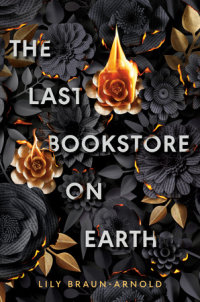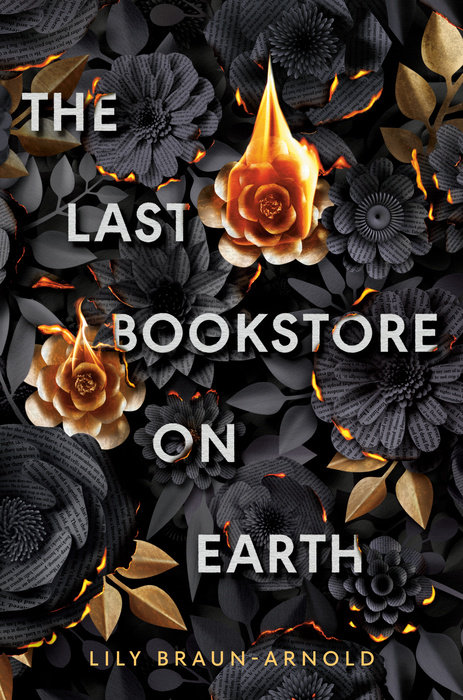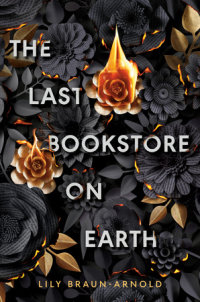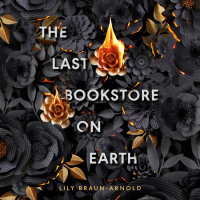Chapter One
I’ve given this whole thing enough thought that I can confidently say overtime sucks. Especially 9,667 hours of it.
Girlboss! you might say. You earn that dough!
In response, I roll my eyes.
In response I say: I will die in this godforsaken bookstore, and there will be no one to remove my rotting body from the floor. I will die surrounded by Poe, Nietzsche, and Shusterman, wedged halfway between Young Adult and Classics, and one day some alien archaeologist will find my body and study it like Pompeii. He will not say, Girlboss! You earn that dough! He will say ⊑⏃⊑⏃ ⌇⎍☊☍⟒⍀, which roughly translates to Sucker!
I will die here alone, bored out of my mind.
I will die here, staring at the lock-and-key journals, the ribbon twirlers, and the overly dramatic book covers that litter the Business section. How to Win Yourself a Wife and Make a Million Dollars in Ten Easy Steps! the titles read, as a man with a fake tan and a receding hairline poses below them. On…
Chapter One
I’ve given this whole thing enough thought that I can confidently say overtime sucks. Especially 9,667 hours of it.
Girlboss! you might say. You earn that dough!
In response, I roll my eyes.
In response I say: I will die in this godforsaken bookstore, and there will be no one to remove my rotting body from the floor. I will die surrounded by Poe, Nietzsche, and Shusterman, wedged halfway between Young Adult and Classics, and one day some alien archaeologist will find my body and study it like Pompeii. He will not say, Girlboss! You earn that dough! He will say ⊑⏃⊑⏃ ⌇⎍☊☍⟒⍀, which roughly translates to Sucker!
I will die here alone, bored out of my mind.
I will die here, staring at the lock-and-key journals, the ribbon twirlers, and the overly dramatic book covers that litter the Business section. How to Win Yourself a Wife and Make a Million Dollars in Ten Easy Steps! the titles read, as a man with a fake tan and a receding hairline poses below them. On the rack to my right, the birthday cards with their corny slogans about needing to drink more wine and hating your children have faded almost completely to white. They taunt me, as if to say, Why did you even bother staying? Nothing else here did!
I wasn’t always so alone at the last bookstore on Earth. (At least I think it is. Most cell-phone towers are down, and global communication is on the fritz, so who knows if it’s actually the last bookstore on Earth. It is to me.) I used to have Eva, who was three years older than me and twenty years too old to be dealing with my BS. Eva didn’t mince words. Eva wasn’t afraid of going into the basement at night, even though god knows what was hiding down there. Eva couldn’t sing, but she sure as hell tried. She left nine months and seventeen days ago.
She said that she wanted to “explore.” She wanted to “see what was left of the world.” She said it in the same way parents say, “I’m not mad, I’m disappointed,” and “I really did enjoy your band concert and didn’t at all notice when you messed up in measure thirteen of Contrapunctus Nine.” She wouldn’t look at me in my eyes.
I told myself it was okay and that I was fine with it. I told myself that I liked the quiet that hung in the air because how much did I really like people in the first place? How much did I really need someone to talk too loudly and chew with their mouth open? I told myself that there was a difference between being alone and being lonely. They weren’t a package deal.
I told myself she would be back soon, like she said she would be, and I counted the days on the wall, adding tally marks in permanent marker until I lost count and energy. After the almost-end-of-the-world, when I realized I had no home to go back to, I had chosen to come back here. So had Eva, until she didn’t.
I unhook the closed sign in the front window, the metal uncomfortably warm between my sweaty fingers. I try not to think about Eva and the tally marks and how unbearably hot it is. Tendrils of hair slick themselves to the back of my neck, having managed to weasel their way out of a sloppy ponytail. I try not to think about anything as I look at the miles of nothingness outside.
The middle of suburban New Jersey, of course, is no more interesting after the almost-end-of-the-world than it was before. Even though there are no more terrible drivers or men with scary accents who say things like “pork roll,” “Bruce Springsteen,” and “down the shore,” there are also no more Coke slushies or Wawas. It’s a net-zero equation.
I flip the closed sign on the door so that it says open, even though what I really want to do is hurl it at the wall. But I don’t, because I did that yesterday and it absolutely didn’t help. Instead, I stare through the glass at the voids left behind. The shadows where people used to be, sitting under the husk of an oak tree that looms in the square. Crawling through the debris, the smashed windowpanes, and splintered wood. Sliding out of the cars that lurk, discarded, on the side of the road.
Wouldn’t it be funny if it were all a dream? Like a bad story written in the fifth grade that ends with And then, she woke up. A slapdash ending to a half-assed tale. Some cursed, messed-up nightmare of a dream. I’d wake up in bed, a thousand light-years away, a sheen of sweat on my forehead, and stare out at the moon from between the slits in my curtains. I’d say to my parents the next morning at breakfast, You won’t believe the cursed, messed-up nightmare of a dream I had, and the statement would hang in the air until I remembered that it’s over. It didn’t matter anymore.
Through the fogged-up window, I can see a man in a faded navy peacoat stumble down the road. He fumbles with his coat buttons and looks around the desolate open space. He does not see me watching him yet. He does not know that he is the first person I have seen in days. He does not look happy to be here.
I didn’t think I’d be seeing him again so soon.
When he sees my shadow in the window, he pauses and looks around the deserted town square before grimacing and striding toward the door.
Chapter Two
When I first met the man in the faded navy peacoat, or Peacoat Man, as I’ve taken to calling him, Eva had been gone for two days. I’d devolved into a vampiric existence, not sleeping, not eating. And sure, it’s not like we were ever anything more than friends—although my crush had grown to a size that I had never before encountered—but it hurt like something more. I spent my time picking at my fingernails and watching them bleed. I didn’t know what to do except stare at the ceiling and wallow in my own uselessness.
I thought I had gone mad when I first looked out the window and saw a figure approaching. For an instant, I was transported back to normal times, when I’d pass the hours watching people walk by from inside the comfort of the air-conditioned store. And sure, maybe I shouldn’t have, but out of reflex, I smiled at him.
I don’t know if that’s what started it all. My gleaming smile could have been the catalyst that led me to this particular point in time. Or maybe the man was going to come into the bookstore whether I let him in or not. Maybe he would have gone all zombie movie on me and busted down the door with a rusted chain saw. Still, as he reached for the door handle, he smiled back, and I let him in.
He had come to buy a book about birds, or at least that’s what he said, and he even tried to hand me a crumpled twenty-dollar bill in payment.
He said, “I have nothing else to give you.”
I laughed at its uselessness, but I took it anyway. At that time, I couldn’t understand what value a book had in this new world. I mean, I understood what it meant to me, but to the rest of the world? It soon became clear that I severely underestimated the power of distraction. Peacoat Man chuckled when I asked him if he wanted a paper bag, or birthday wrapping.
He said, “No thank you. My birthday isn’t until March. But thank you for making my day a little less dull.”
I said, “Thank you for stopping by. Please do come again.”
•
The bell above the door chimes as Peacoat Man walks in, and I smile. He pauses for a moment before he plasters on a smile in return, and I watch the corners of his eyes crinkle slightly as he combs his fingers through his sweat-slicked hair. I watch something flicker across his face, as if he’s wondering whether to hide his emotions for my sake. I make the choice for him, sticking to our normal pleasantries as I put down my copy of The Island of Dr. Moreau.
“It’s a little hot to be wearing a coat.” I can feel the back of my tank top adhering to my skin in the sticky July heat. I say it as if he hasn’t been wearing the same coat every single time I’ve seen him, even as the months slipped into summer and the temperature climbed. I say it as if I haven’t said it a million times before in the seventeen times I’ve seen him these past nine months.



